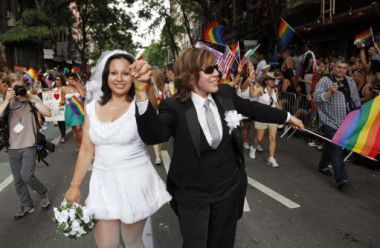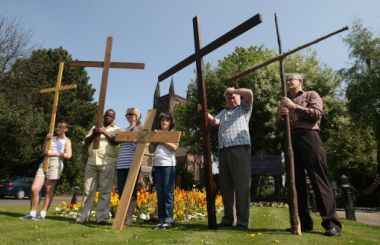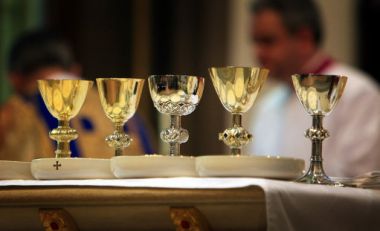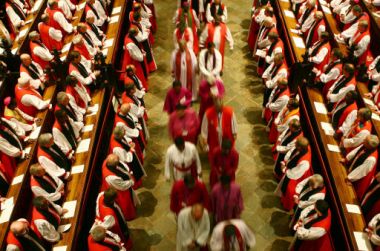Has the Church been 'caricatured' as anti-gay? An FAQ

What does it mean to be "anti-gay"? Archbishop of New York Timothy Dolan recently gave an interview to NBC's 'Meet the Press' programme where he discussed the Catholic Church's position on, amongst other things, the Affordable Care Act (aka Obamacare), abortion, and gay rights. The one sentence that many news outlets have chosen to run with from this discussion is where Archbishop Dolan said that the Church had been "caricatured" as being anti-gay, rather than actually having any real hostility towards homosexuals.
The primary reason people had this view, he said, was that opponents had "out marketed" the Catholic Church.
"When you have forces like Hollywood, when you have forces like politicians, when you have forces like some opinion-moulders that are behind it, it's a tough battle," he said.
"We're pro-marriage, we're pro-traditional marriage, we're not anti-anybody," he said, while in the same breath saying that the Church was not going to give up the fight to stop the 'stampede' towards gay marriage being accepted in every US state."
To many minds, this statement seems contradictory. How can the Church claim to not be anti-gay and yet be anti-gay marriage? Archbishop Dolan sees this question emerging within the Church.
"We get backlash from those who think we are too gracious and compassionate and loving and accepting of gays, and then we get backlash from gay people who feel that we are not tolerant enough of them."
So which is it? Is Timothy Dolan being hypocritical, or is there something more complicated going on here. The following are some common questions regarding the Church's position on homosexuality answered, explaining why Archbishop Dolan takes the views he does.
Q: Is the Church Anti-gay?

More than half the words in that question need defining. The Church is a huge entity of more than two billion people globally. There are some who are aggressively persecuting of gay people like the infamous Westboro Baptist Church, and others who are widely accepting of the gay community, such as the Quakers. Not to mention the issues of actively defining the notion of "Church" with some arguing that the Quakers being a "society of friends" is a very different thing from a Church, or the question of the Chinese "Three Self" Churches which are headed by a fundamentally atheistic national authority.
Also, what does anti-gay mean? Is that the same thing as homophobia? Does that mean you want to kill homosexuals? Or do you believe people shouldn't be gay? Or that homosexual acts are sinful, but attractions aren't (after all, Jesus was tempted but did not sin)? Many in the Church believe that last one but still would not consider themselves anti-gay.
Q: How can you believe that homosexuality is sinful and not be anti-gay?
Because many Churches consider an important difference between "being" gay, compared to homosexual acts. It's important to note that the idea that someone "is" gay is a relatively modern one, only having existed for approximately the last 300 years or so. The more common understanding throughout history is that people did not identify as a particular sexual orientation, but rather that they simply had sex with different people. In Latin, you will not find a word for "homosexual" in the understanding we now use it in. "Much as I would love to go along with the emerging 'born gay' consensus, I can't," gay rights campaigner Peter Tatchell says on his website. "The evidence does not support the idea that sexuality is a fixed biological given ... Born gay? No. Human sexuality is too varied and complex to be reduced to a simple equation of genes plus hormones."
We can point to various Bible verses that suggest strongly that homosexual acts are sinful, but also point prominently to the story of the adulterous woman that Jesus meets in John's Gospel, Chapter 8, Verses 1-11. In this incident, Jesus is openly condemning of the woman's sexual sin, and yet he shows his love for her by protecting her from those who would wish her harm. It is the perfect example of the modern Christian motto "Hate the sin, love the sinner". Archbishop Dolan has no desire to marginalise gay people from within his church. Nor does he wish them ill, or harm, or any other kind of problem. He does however simply point out what he believes to be biblical truth. That homosexual physical acts are sinful.
Ultimately, the Bible preaches a message of forgiveness of sin, and if we cannot separate the sin as the action from the sinner as the person, we are not going to get far as Christians.

Q: So is that why so many in the church are opposed to gay marriage?
Yes. Many in the Church basically feel that what gay marriage does is to pretend that those verses are in the Bible, and that in fact homosexual relationships are the same as heterosexual ones, when they believe God says they are not. While heterosexual acts as part of marriage were a cornerstone of the perfect picture in Eden where God told Adam and Eve to "be fruitful and increase in number", several verses in the Old and New Testament are condemning of homosexual acts. Consequently, many cannot countenance a sinful relationship being put on the same kind of pedestal with the same recognition as a God instituted marriage.
Q: But surely that isn't enough of a reason to block gay people getting the same rights as straight people?
Some in the Church say it is, some say it isn't. When you add in the question of legal marriage, and the rights associated with that, the picture becomes more diverse in terms of opinions.
Some believe that the Church should stay out of the debate about homosexual marriage recognition as far as the state goes, because Jesus said "render unto Caesar what is Caesars" implying that there should be distinction between the role of the Church and the role of the state.
Others take the view that the role of the Church was to be a light to the world about morality, and so the Church should instruct the state in what is right and wrong, and absolutely should stand up against gay marriage. When queried about whether this is a rights issue, many argue that the rights are equal in that everyone has the right to marry someone of the opposite sex. The issue they have is that they argue marriage isn't, from a purely legal perspective, about love. There isn't a human right, they argue, to have your relationship with a person you are romantically attracted to legally notarised, and it is no more a right than you have a right to a steak while in a vegetarian restaurant.
Q: So if the Church (the sections of it that believe homosexual acts are sinful) isn't anti-gay, is it pro-gay?
Many in this section of the Church would argue that they don't break people down like that. They are pro-gay in that they are pro-everyone. They want everyone to be saved and to have the kind of deep, enriching, life transforming relationship with Jesus that everyone should have. The doors of the church are open to all. However, most cannot be pro-gay in the way that many in the gay lobby might wish - i.e. in endorsing and affirming sexual relationships between people of the same gender as equal to heterosexual relations. Jesus loved the adulterous woman but he also told her to leave her life of sin. This is a lesson that all Christians have to apply to themselves as Paul notes in Romans, we all fall short of the glory of God in some way. The question we all have to ask ourselves when we decide to commit our lives to God is: do we trust Him enough to drop our own standards and fully embrace the life He has in mind for us? It is the heart of the Church for all people that they would do as we are all invited to do: "Come and see."
Q: So why have so many people characterised the Church as anti-gay?
Several different reasons. Firstly, because the activities of extremists within the Church are far more visible than those of the moderates, and so they take up more media coverage, meaning that people think that's how all Christians think and behave. After all, the headline "Church is welcoming of new gay member into congregation" isn't one you're likely to see. Radical messages are far more attention grabbing. Parts of the Church have not always spoken on this issue with grace and humility and it can hardly be surprising, therefore, that an essentially non-churchgoing generation has become hostile and defensive.
Second, because few people take the time to listen to the nuances of the debate. We see this a lot in media coverage of other issues too. For example, there was relatively little Western media coverage of the civil war in Sri Lanka for many years because it was hard to tell the story of the events in a way that made it clear who was good and who was bad. The media works well when it deals with simple polarising narratives. More complex ones are difficult, especially when they run against the grain of so much that people see and hear every day.

The idea of "love the sinner, hate the sin" is one that many find hard to comprehend. Especially when so much media encourages us to vilify people of various kinds for various crimes. It is much simpler for many to pigeonhole the Church as anti-gay, and make it a clear polar opposite to wider society.
Third, because there aren't that many Christians in the arts and popular media. Few make it into a position to speak truth to powerful network executives that actually they are misrepresenting issues, and that it's more complicated than that. Many in the media are in fact actively hostile to Christianity, with certain pundits and powerful personalities taking direct objection, and using their position to further stack the debate against the Church.
Q: So how is the Church trying to fight this?
The only way they can. By speaking and living out the truth of the Bible, the whole Bible. That means that those who believe in the parts about homosexuality being sinful also believe the parts about loving others as you love yourself. Only though care and love for all those who call themselves homosexuals can the Church truly show its witness on this issue.
Q: What else can the Church do?
Fundamentally, what the Church needs to do is recognise that other sins are no less weighty - Jesus tells us to first remove the plank from our own eye and only then will we be able to remove the speck from our brother's eye. The Church plays an important role in challenging the mores of the day if these are going astray from Biblical values, but we can be so good at that that we forget to be our own harshest critic. If Christians know that homosexuals are sinners just like they are sinners, the division between "us" and "them" becomes less palpable, and people can just see one another as brothers and sisters who need God's love and care. When homosexuality is preached about (which is actually relatively infrequently in most churches), it should be with a spirit of love and hope rather than firebrand confrontation. Thumping home that something is a sin doesn't appeal to anyone. Thumping home that we're all sinners, and Jesus died for all, that is important. It is wonderful to see the formation of groups like LivingOut by members of the Church who have same-sex attractions, but have chosen to shun them in favour of abstinence out of a shared conviction that homosexual relationships are not God's will for them. It is exciting that this emerging conversation about a Biblical alternative to active homosexuality is being spearheaded by those very Christians experiencing same-sex attractions firsthand. More conversation and prayerful support for members of these groups can only be a good thing as the Church seeks to present a doubting world with a fulfilling and convincing alternative.











